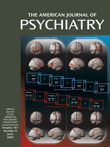New Evidence of Association Between COMT Gene and Prefrontal Neurocognitive Function in Healthy Individuals From Sibling Pairs Discordant for Psychosis
Abstract
OBJECTIVE: Using a sample of sibling pairs discordant for psychosis, the authors attempted to replicate the findings of previous studies suggesting that the functional genetic polymorphism Val158Met in the catechol O-methyltransferase (COMT) gene influences prefrontal cognitive function and increases the risk for schizophrenia. METHOD: Eighty-nine sibling pairs discordant for psychosis were genotyped for this polymorphism and were assessed with the Wisconsin Card Sorting Test, a measure of prefrontal function. Additionally, the preferential transmission of alleles for this polymorphism was analyzed in a sample of 89 nuclear families in order to examine the genetic association. RESULTS: In the healthy siblings, a linear relationship was seen in which performance on the Wisconsin Card Sorting Test was associated in an allele dosage fashion with COMT genotype (i.e., fewer perseverative errors with higher number of methionine alleles). However, this association was not observed in patients. Furthermore, no evidence of genetic association with psychosis was detected. CONCLUSIONS: These results seem to confirm the role of COMT genotype in the modulation of executive functions related to frontal lobe function in healthy individuals but not in schizophrenia patients.



